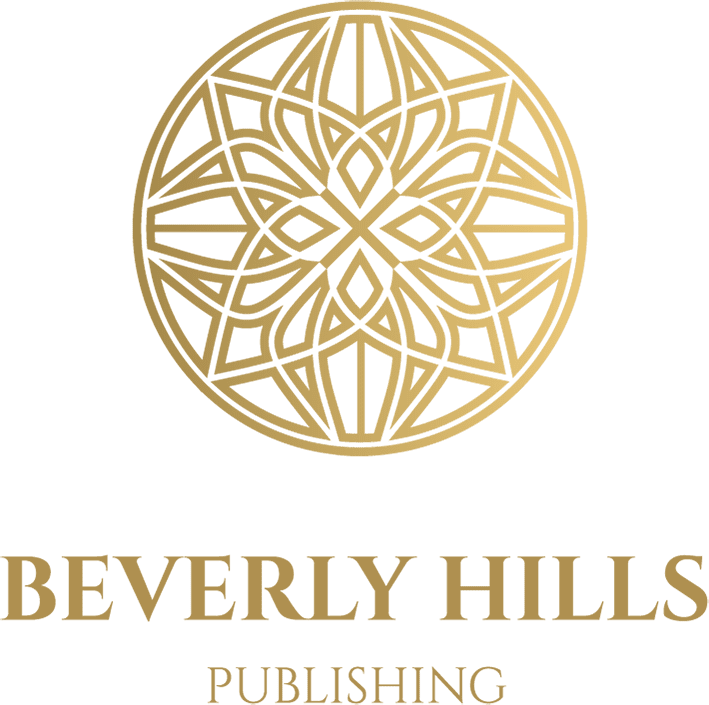At Beverly Hills Publishing, we understand the importance of protecting your literary creations. Author copyright strategies are essential for safeguarding your work in today’s digital landscape.
This blog post will guide you through the fundamentals of copyright, practical steps for securing protection, and effective methods to shield your writing in the online world.
What Is Copyright and Why Does It Matter?
The Essence of Copyright Protection
Copyright is a legal right that grants authors exclusive control over their original literary, dramatic, musical, or artistic creations. This protection begins the moment you create your work in a tangible form (written on paper or saved digitally).
The Scope of Copyright Protection
Copyright covers a wide range of creative works. For authors, this includes:
- Novels
- Short stories
- Poems
- Articles
- Blog posts
- Song lyrics
- Screenplays
- Non-fiction works
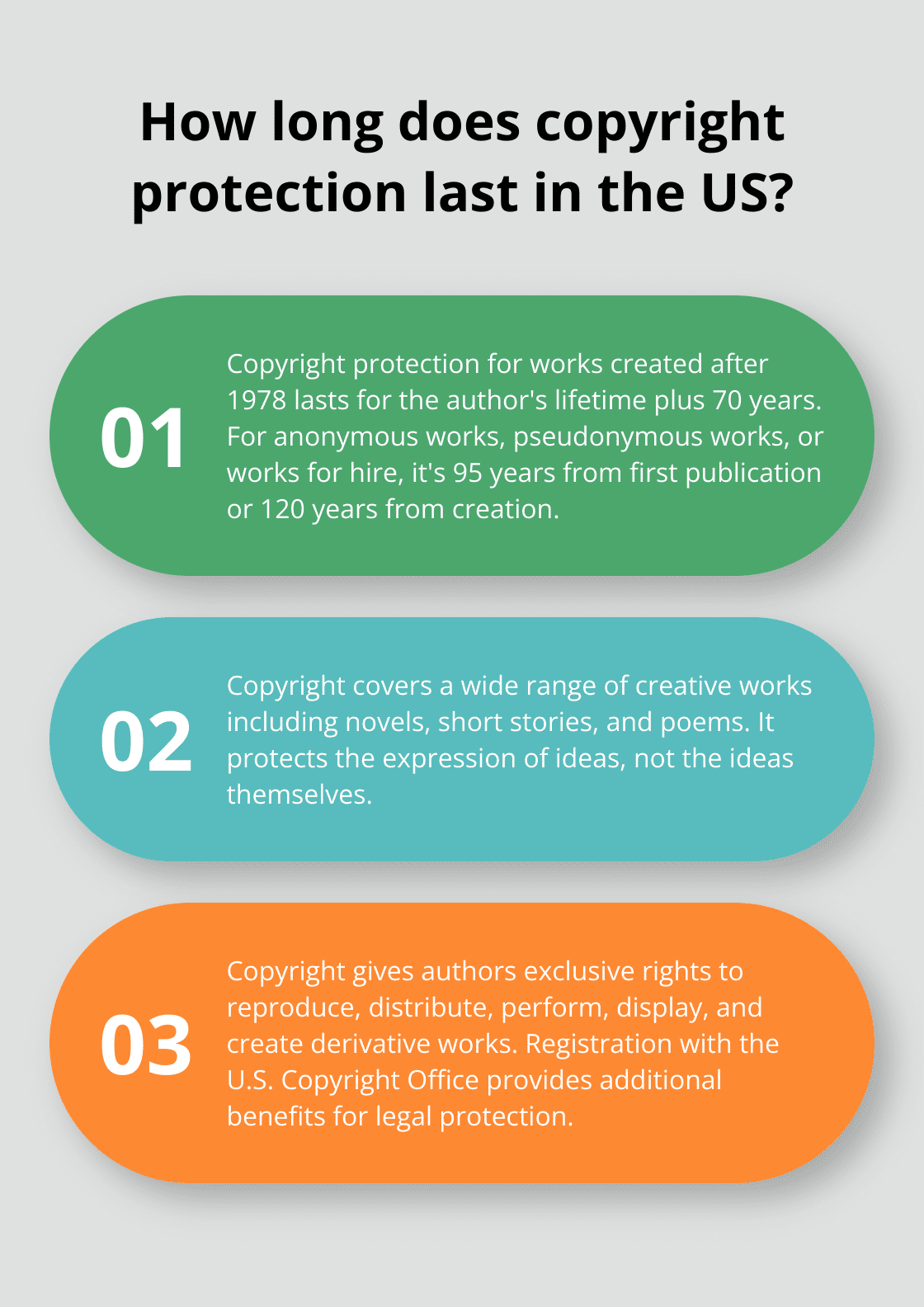
It’s important to note that copyright protects the expression of ideas, not the ideas themselves. The specific words you use to tell a story are protected, but the general plot or concept is not.
Duration of Copyright Protection
In the United States, copyright protection generally lasts for the life of the author plus 70 years for works created after 1978. For works created anonymously, under a pseudonym, or as works for hire, copyright lasts for 95 years from the year of first publication or 120 years from the year of creation (whichever expires first).
The Power of Copyright for Authors
Copyright is more than just legal protection; it’s a tool for authors to control and monetize their work. It gives you the exclusive right to:
- Reproduce your work
- Distribute copies
- Perform the work publicly
- Display the work publicly
- Create derivative works
This means you decide who can publish your book, adapt it into a movie, or translate it into other languages.
Copyright Registration: A Strategic Move
While copyright protection is automatic, registering your work with the U.S. Copyright Office provides additional benefits. Registration:
- Creates a public record of your copyright claim
- Is necessary to file a lawsuit for copyright infringement
- Allows you to seek statutory damages and attorney’s fees in court
The process is relatively simple and inexpensive, especially when compared to the potential benefits it provides in case of infringement.
International Copyright Considerations
Copyright laws can vary from country to country. However, many nations are signatories to international copyright treaties, which provide a degree of protection for your work across borders. This is particularly important if you plan to publish or distribute your work internationally.
As we move forward, it’s essential to understand how to secure copyright protection for your work effectively. The next section will explore the practical steps you can take to register your copyright and maximize its benefits.
How to Secure Copyright Protection
The Importance of Copyright Registration
Copyright registration with the U.S. Copyright Office provides authors with a powerful tool to protect their creative works. This process establishes a public record of your copyright claim, which proves invaluable when you need to demonstrate ownership. More critically, registration serves as a prerequisite for filing a copyright infringement lawsuit in federal court.
The Registration Process
To register your copyright, follow these steps:
- Access the U.S. Copyright Office website
- Set up an account (if you don’t have one)
- Select the appropriate work type (e.g., literary work for most books)
- Complete the online application form
- Submit the registration fee
- Provide copies of your work as required
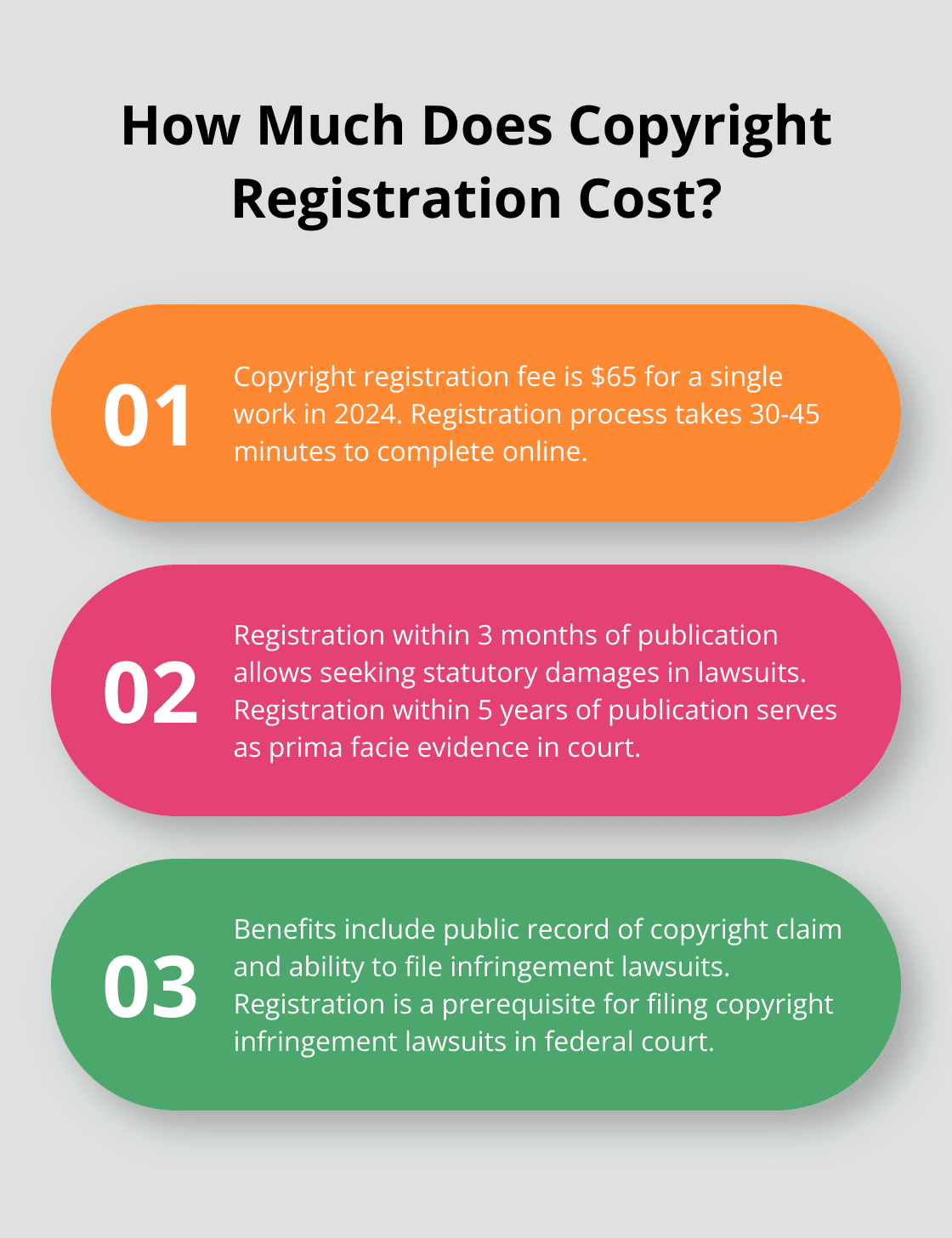
The entire process typically takes about 30-45 minutes to complete. While the Copyright Office may take several months to process your application, your effective registration date will be the day they receive your completed application, fee, and work copies.
Benefits of Timely Registration
Registering your copyright before an infringement occurs (or within three months of publication) allows you to seek statutory damages and attorney’s fees if you win an infringement lawsuit. This advantage proves significant, as demonstrating actual damages often presents challenges and incurs substantial costs.
Furthermore, if registration occurs within five years of publication, it is considered prima facie evidence in a court of law. In legal disputes, this shifts the burden of proof to the alleged infringer to disprove your copyright claim.
Cost-Effective Protection
As of 2024, the fee for a standard electronic filing stands at $65 for a single work. This modest investment can yield enormous returns if you ever need to defend your rights in court. The potential benefits far outweigh the initial cost, making registration a wise decision for authors serious about protecting their intellectual property.
Beyond Registration
While registration forms a cornerstone of copyright protection, authors should consider it as part of a broader strategy to safeguard their work. The digital age presents new challenges (and opportunities) for protecting creative content. In the next section, we’ll explore additional measures you can implement to shield your literary creations in the online world.
Safeguarding Your Digital Literary Assets
Implementing Digital Rights Management
Digital Rights Management (DRM) tools help authors control the use and distribution of digital content. These technologies restrict copying, printing, and sharing of work without permission. Major e-book platforms like Amazon Kindle and Apple Books offer built-in DRM options. Authors should consider the benefits against potential reader frustration. Some authors prefer social DRM, which embeds the buyer’s information into the e-book file, deterring sharing without limiting functionality.
Watermarking Your Work
Watermarking deters unauthorized use of content. For e-books, invisible watermarks can contain information about the purchaser. This doesn’t prevent copying but creates a trail back to the source if work is distributed illegally. For promotional materials or sample chapters, visible watermarks with your name or website can be added. Tools like Adobe Acrobat or online services make this process straightforward.
Monitoring for Unauthorized Use
Proactive monitoring protects your work online. Google Alerts for book titles and unique phrases from your work notify you when your content appears online. For more comprehensive protection, services like Copyscape or Plagiarism Checker scan the internet for copies of your text. These tools help you identify potential infringement quickly.
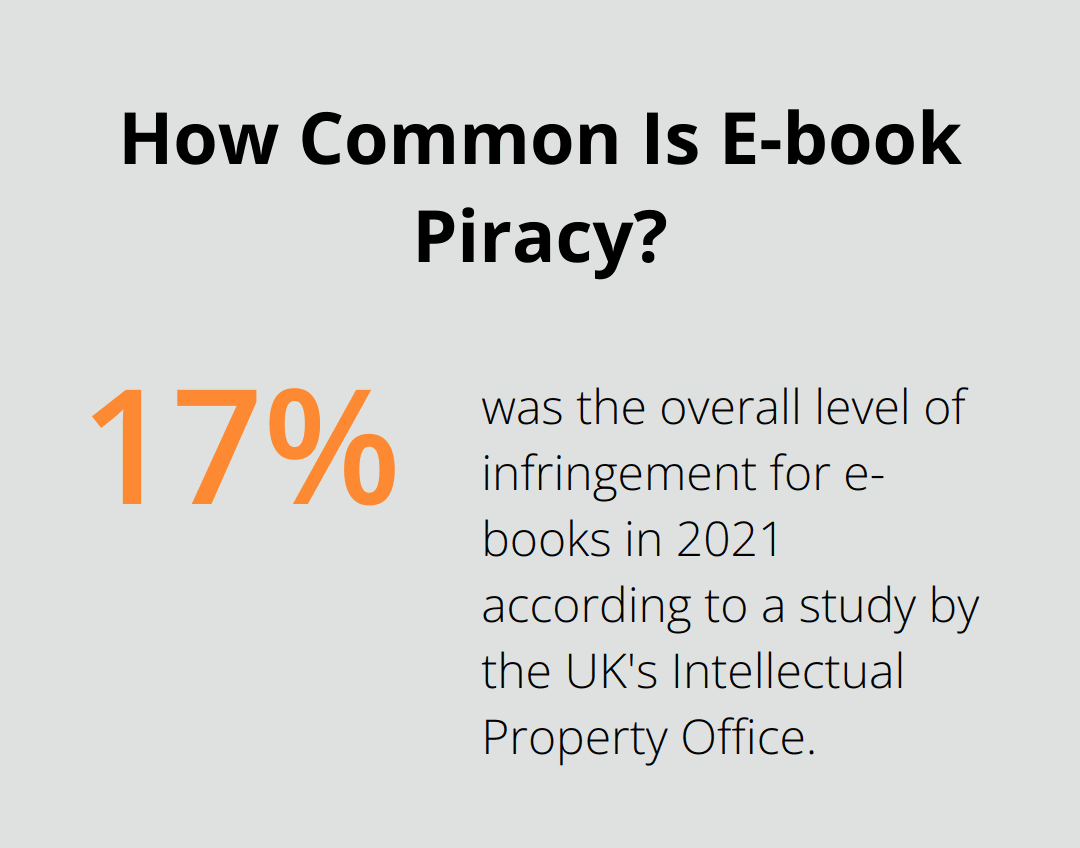
The Association of American Publishers reports that e-book piracy costs the U.S. publishing industry $300 million annually. This underscores the importance of vigilant monitoring and swift action against unauthorized use.
Educating Your Readers
Reader education is an often overlooked strategy. Authors should clearly communicate copyright terms and the impact of piracy. Include a copyright page in your e-books explaining permissible uses. Many readers don’t understand the harm caused by sharing e-books illegally. A study by the UK’s Intellectual Property Office found that the overall level of infringement for e-books was 17% in 2021.
Leveraging Blockchain Technology
Emerging blockchain technologies offer new possibilities for copyright protection. Platforms like Po.et allow authors to timestamp their work on the blockchain, creating an immutable record of creation and ownership. While still in its early stages, this technology shows promise for providing indisputable proof of authorship.
Final Thoughts
Author copyright strategies require constant vigilance and adaptation in the ever-changing digital landscape. The protection of literary creations involves understanding copyright law, registering works, and implementing digital safeguards. Authors must stay informed about emerging technologies and legal developments to effectively defend their intellectual property.
Beverly Hills Publishing offers a comprehensive approach to help authors protect their work and maximize their success. We combine innovative publishing strategies with branding and marketing techniques to elevate authors beyond traditional publishing models. Our integrated approach aims to establish authors as leading authorities in their fields while enhancing their personal and professional brands.
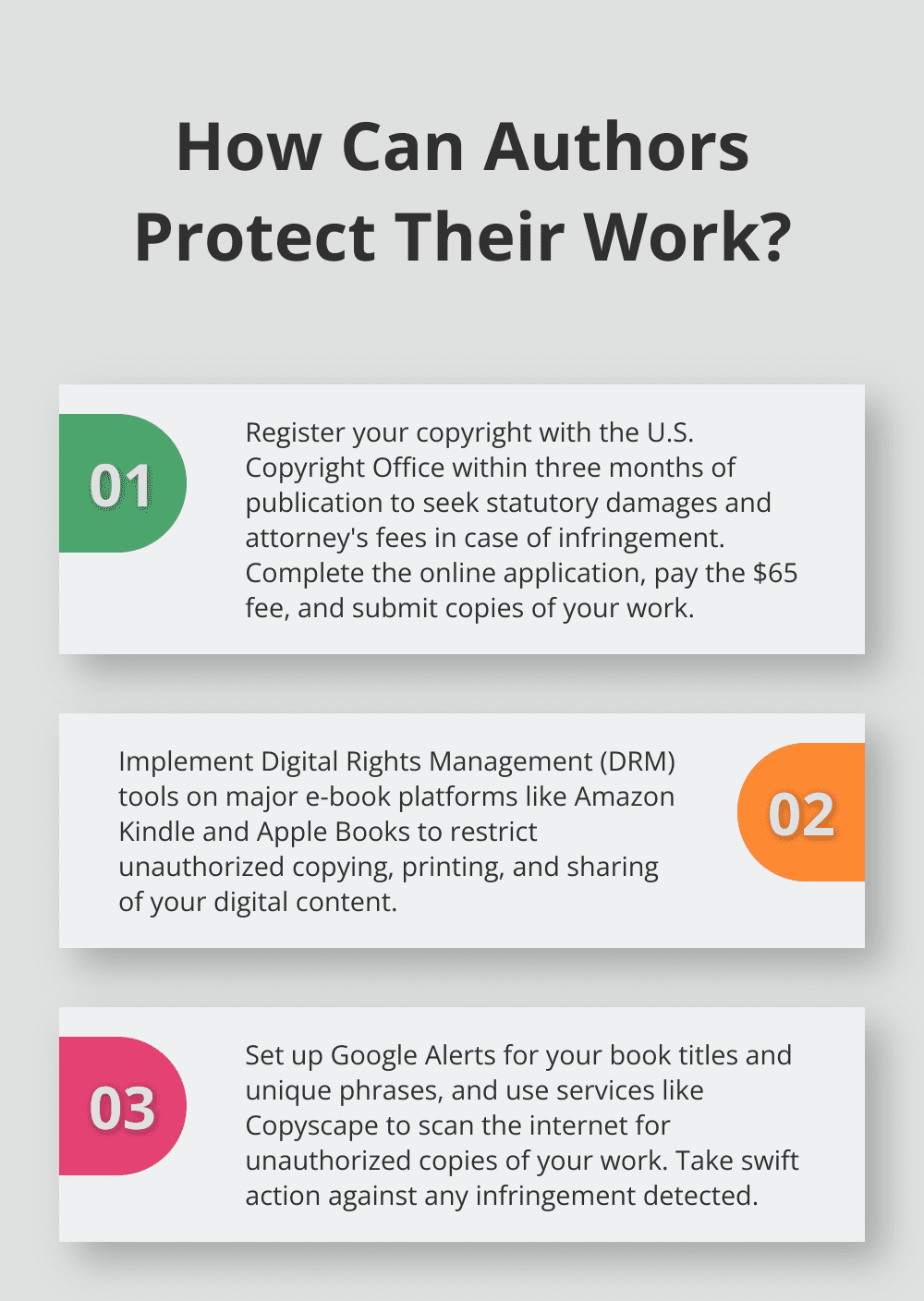
The U.S. Copyright Office website provides up-to-date information on copyright laws and registration procedures. Professional organizations like the Authors Guild offer valuable guidance for writers navigating intellectual property rights. Authors who implement effective copyright strategies invest in their future as writers and safeguard their rights in the evolving literary landscape.















































































































































































































































